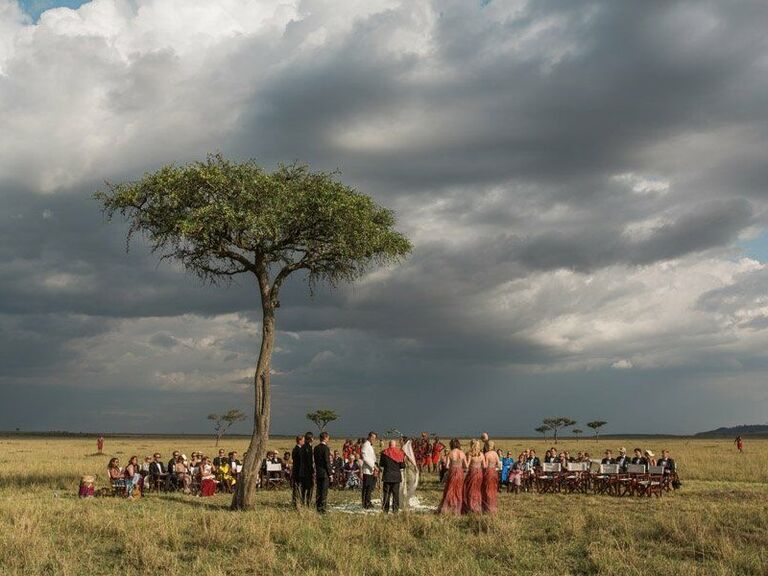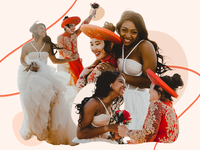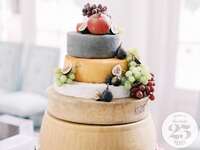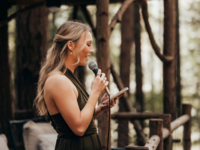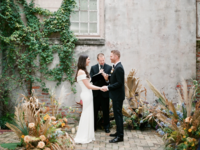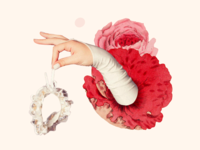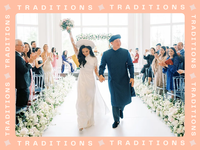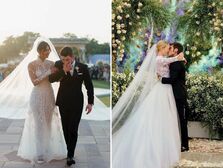Wedding Traditions in Kenya That You Should Know
If you're heading to East Africa for a destination wedding or are in the process of planning your own and want to honor you or your partner's Kenyan heritage, there are a variety of Kenyan wedding traditions you can incorporate into the big day and other wedding festivities that will make your celebration extra meaningful.
To better understand some Kenyan wedding traditions you may want to consider incorporating into your big day, we spoke with expert wedding planner Salima Bertoglio and her team at Kwa Moyo Weddings about some wedding traditions in Kenya and how you can integrate them into your wedding festivities.
A Brief History of Kenyan Wedding Traditions
Kenya is a large country in East Africa with more than 40 tribes. With that being said, wedding traditions and customs may vary from tribe to tribe. However, "in Kenya, weddings are considered a rite of passage which a grown-up is expected to undergo. It involves the exchange of vows either verbally, exchange of rings, by payment of dowry (this can also be done by couples who want to get into a matrimonial relationship without necessarily doing the wedding part), blood (the groom cuts his arm and the bride sucks his blood and vice versa). This rite of passage involves the social unit of families involved (i.e grandparents, parents, uncles, aunties, brothers, sisters and neighbors; in some cases, the dead relatives are consulted in this rite too)," says Bertoglio.
Kenyan Traditional Wedding Attire
From the to-be-weds to the guests, there are some customary ensembles you can expert to see at a traditional Kenyan wedding. Here's what you need to know about traditional Kenyan wedding attire.
Traditional Kenyan Wedding Guest Attire
Traditional Kenyan wedding attire varies from tribe to tribe throughout the country. Colors may vary, but black is largely avoided as it is thought to attract bad omens, notes Bertoglio. With this being said, you shouldn't expect to wear or see many (if any) people wearing back on wedding day. Furthermore, "guests are expected to wear colorful clothes. Women are expected to tie one lesso on the waist and another one to cover from the neck to waist," says Bertoglio. She adds that people today don't usually wear traditional dresses and instead opt for dresses of their choosing. "As for men they carry a leather bag "mwangeka" which hangs from the shoulder to the back," says Bertoglio.
Wedding Dress
Wondering what a traditional Kenyan bride may don? When it comes to the wedding dress, "the bride's dress should not expose her chest, armpits and her legs as a sign of girl's respect to guests attending the wedding," explains Bertoglio.
Traditional Taita Wedding Attire
Among the Taita tribe, mahando (a skirt made of sisal worn around the waist) is traditionally worn, explains Bertoglio.
Traditional Kikuyu Wedding Attire
Guests attending weddings of those in the Kikuyu tribe traditionally wear brown attire that is embellished with shells, Bertoglio adds.
Kenyan Prewedding Traditions
There are several prewedding traditions that many tribes participate in. Read on for our in-depth guide on what you can expect.
Preparing Girls for Marriage
Many traditional Kenyan prewedding traditions involve preparing girls to be useful in their marriage. Bertoglio notes that "a room is set for her [the girl] in their house where aunties come and teach her how to be a respectful woman. The girl is not allowed to cook or do any hard work during this time. She showers with the best soaps and refines her skin for her big day. Relatives are allowed to visit the family bringing resources for the girl's upkeep but are not allowed to often see her. She is even escorted when visiting the toilet. Some traditions believe it is a way of keeping her from 'evil eyes'."
Groom Guesses the Bride
Additionally, Bertoglio adds that "on the prewedding day, several girls are covered in new lessos and all assembled outside; the groom is then required to move around, look at the girls and pick the one he thinks is his bride." This is a tradition that takes place among many tribes including the Taita and Kikuyu.
Cow Thigh
Cows sometimes play a role in traditional Kenyan prewedding traditions. "In some traditional weddings, before the ceremony, the groom's family slaughters a cow and slices off one full thigh and sends it over to the bride-to-be's house; this is done to ensure that those not attending the wedding will have something to eat and give their daughter happily," explains Bertoglio.

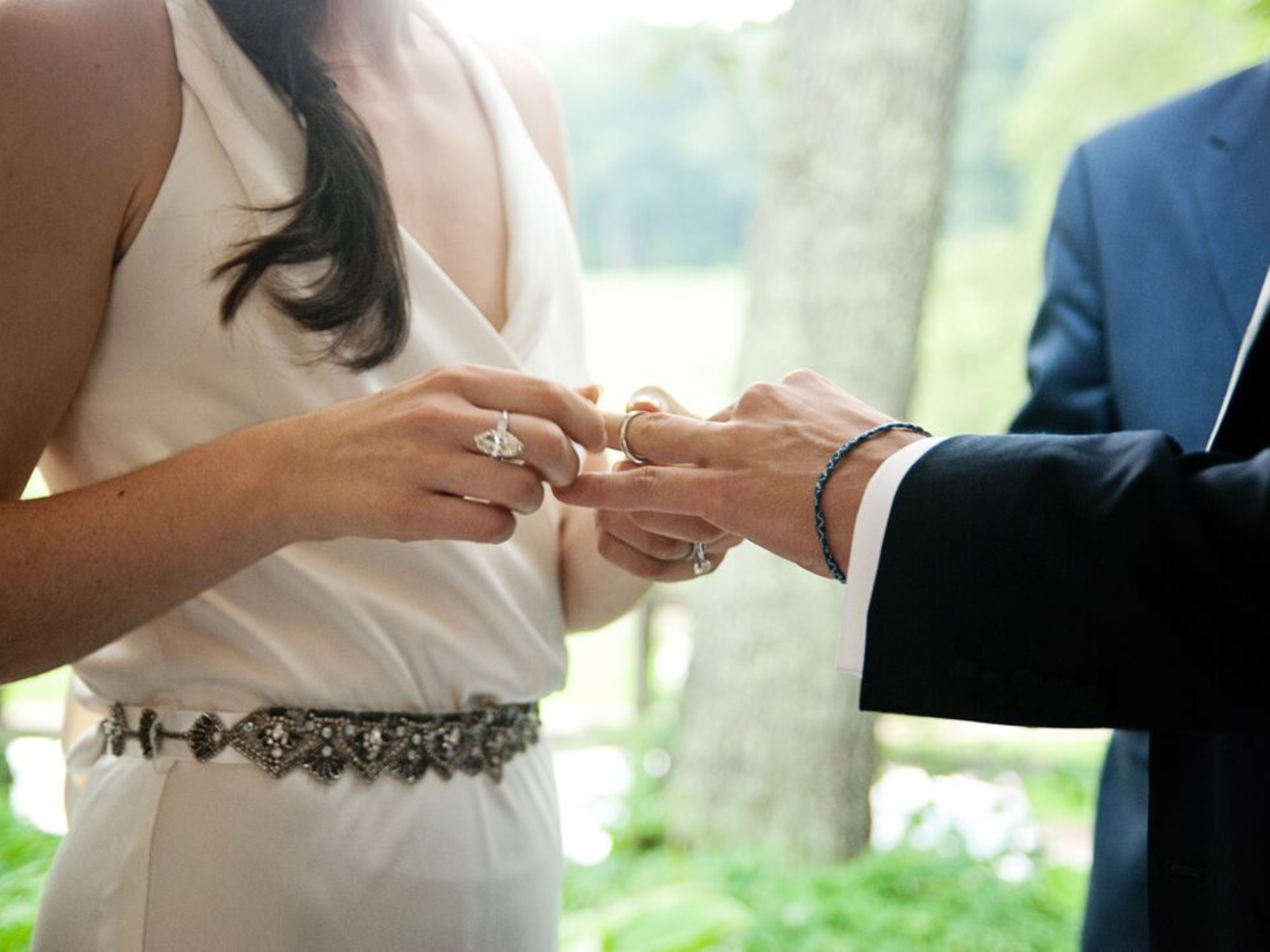

Role of Family and Friends
Family and friends of the to-be-weds often play an integral role before the wedding. "Strong young men carry the thigh and women accompany them singing wedding songs as they head to the bride's home and then, around midnight, they are given a suitcase containing the bride-to-be's clothes and bring them to the groom's house. On the other hand, the groom's family and friends sing as they receive the suitcase (on this occasion, the groom does not go to the bride's family)." Bertoglio explains that "taking the girl's clothes to the groom's house signifies the willingness from the girl's family to give their daughter's hand in marriage."
Kenyan Traditional Wedding Ceremony Customs
The breakdown of a traditional Kenyan wedding ceremony takes place as follows: "a traditional wedding ceremony starts from the night before the wedding whereby the bride spends time with grown-up women who talk/advise her and also bless her. On the wedding day, the bride is carried by uncles by hand as she is not allowed to step her foot on the ground. Upon reaching the groom's home, several lessos/khangas are spread on the ground for her to step on. Upon arriving, she is received with songs of celebration. At this moment she is fully covered with new lessos on top of her wedding dress. After the procession, the groom is allowed to unveil her to prove she is the one followed by the exchange of vows, congratulatory messages from close family members and prayers for the new couples. Lastly, food is served and people start leaving the compound," explains Bertoglio.
Ring Exchange
Although rings are now part of many Kenyan weddings, "in the old days, rings were not involved; each tribe would have a different kind of vows exchange (i.e. in the Kamba tribe, by blood, plus the bride would have her face tattooed with the pattern she liked most. Nowadays, these traditions have mostly disappeared and have been substituted by the western ring exchange," says Bertoglio.
Kamba Wedding Ceremony Traditions
Within some families of the Kamba tribe, "the new couples are asked to stretch forth their hands. The groom's father will then put alcohol or water in his mouth and spit it on their hands to signify that he has blessed them with riches," says Bertoglio.
Kenyan Traditional Wedding Reception Customs
Food is central to most Kenyan wedding receptions. Here's a look at the traditional cuisine you can expect at a Kenyan wedding.
Traditional Kenyan Wedding Cuisine
Traditional Kenyan wedding food must include "the 'kimanga' which is a mixture of beans and bananas or arrowroots all mashed together. Drinks may include fermented milk, tea and the traditional liquor: 'Mbangara' prepared from fermented maize chaff and sugar [is popular among the Taita], Muratina for the Kikuyus or Busaa for the Luhya."
Traditional Taita Wedding Cuisine Tradition
Ancestors may have importance in some Kenyan wedding traditions, especially for the Taita. Bertoglio explains that "in the Taita tribe, liquor is poured on the ground before drinking. This is believed to be a way of serving the ancestors who are long gone." She also notes that sometimes couples feed each other a piece of meat instead of a piece of wedding cake.
Traditional Kenyan Wedding Gifts
What's the scoop on wedding gifts at traditional Kenyan weddings? Here's what you should know.
Traditional Taita Wedding Gifts
Bertoglio describes some common traditional wedding gifts that newlyweds in the Taita tribe are traditionally gifted with including "'Kishere," a guard for storing fermented milk, "fuwa," a wooden bowl or made of calabash, "luficho," a wooden cooking stick, "luwaza," a wooden serving spoon for porridge and soups, and lungo, a tray made of reeds," says Bertoglio.
Traditional Luhya Wedding Gifts
As far as traditional wedding gifts for Luhyas go, "the bride is given a Ruderu, a tray, ïngokho, chicken, and other items," says Bertoglio.
